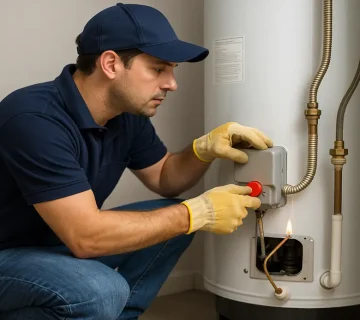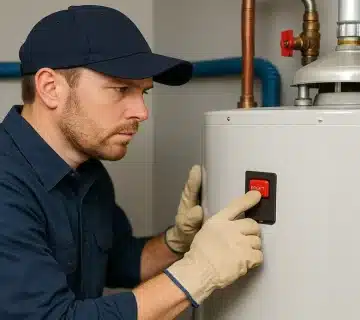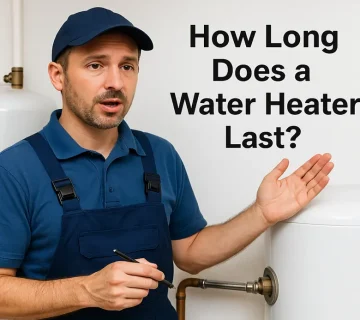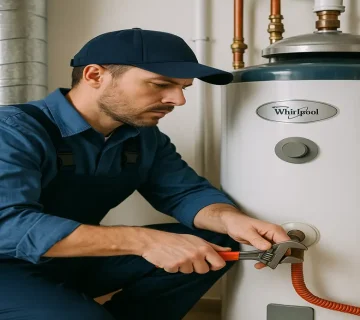Water heater replacement is essential when your unit no longer provides efficient heating or shows signs of wear and tear. Understanding when to replace your water heater can save you from costly repairs and unexpected breakdowns. In this guide, we’ll discuss key indicators, costs, and benefits of upgrading your system.
1. Water Heater Replacement Is Needed When You Notice Rusty Water
If your hot water appears rusty, it could indicate corrosion inside the tank. This is a strong sign that water heater replacement is necessary before leaks occur. Rust can also develop in the pipes, so it’s essential to rule out whether the issue stems from the plumbing or the heater itself.
How to Check for Rust
- Drain a few gallons of water from the heater into a bucket.
- If the water is consistently rusty, your tank is likely corroding inside.
- Consider a professional inspection to confirm the issue.
2. Frequent Repairs Indicate the Need for Water Heater Replacement
Constant repairs on an aging unit can cost more than a new system. If you’re scheduling repairs frequently, consider a water heater replacement to save on long-term expenses.
Common Repairs That Signal a Failing Unit
- Replacing heating elements
- Fixing leaks or cracks
- Constantly resetting the thermostat
- Water pressure fluctuations
If these issues persist, it might be time to invest in a new system.
3. Water Heater Replacement Is Required When There Are Leaks
Leaks around your water heater suggest internal failure. A leaking tank cannot be repaired, making water heater replacement the only viable solution.
What Causes Water Heater Leaks?
- Sediment buildup creating internal pressure
- Corrosion weakening the tank
- High water pressure damaging the heater
Ignoring leaks can lead to major property damage, so immediate action is required.
4. Insufficient Hot Water Signals a Need for Water Heater Replacement
If your system no longer provides enough hot water for your household, upgrading to a newer, more efficient model is a wise decision.
Why Your Water Heater May Struggle to Heat Water
- An undersized unit for your home’s needs
- Sediment buildup reducing efficiency
- Heating elements failing due to wear and tear
Consider upgrading to a larger or tankless water heater for continuous hot water supply.
5. Strange Noises Mean It’s Time for a Water Heater Replacement
Banging or rumbling noises indicate sediment buildup inside the tank, leading to inefficiency. If flushing the tank doesn’t resolve the issue, a water heater replacement is necessary.
Types of Water Heater Noises & Their Causes
- Popping Sounds – Air bubbles trapped in sediment layers
- Rumbling Noises – Water moving through hardened sediment
- Sizzling Sounds – Leaks dripping onto the burner
A noisy water heater is often a sign that your unit is nearing the end of its lifespan.
6. Increased Energy Bills Suggest It’s Time for Water Heater Replacement
An inefficient water heater consumes more energy, increasing your utility bills. Upgrading to a modern, energy-efficient unit can lower costs.
Energy-Saving Tips for Water Heaters
- Insulate the water heater tank and pipes
- Lower the temperature to 120°F to reduce energy use
- Upgrade to an ENERGY STAR®-certified model
A new water heater can reduce your energy bills by up to 20% compared to older models.
7. Your Water Heater Is Over 10-15 Years Old? Consider a Replacement
Most water heaters last between 10-15 years. If yours has reached this age, planning for a water heater replacement ensures continued efficiency and reliability.
How to Check Your Water Heater’s Age
- Look at the manufacturer’s label on the unit.
- Decode the serial number (often the first two digits represent the year of production).
- If your unit is over a decade old, start considering a replacement.
Final Thoughts on Water Heater Replacement
Recognizing the signs of a failing water heater helps you make an informed decision. A timely water heater replacement prevents breakdowns, improves efficiency, and ensures a reliable hot water supply.
For more expert insights on water heater replacement, visit our official blog.
Connect with Value Water Heaters
- Visit Our Website: https://valuewaterheaters.com/
- Check Out Our Tumblr: https://www.tumblr.com/valuewaterheaters
- Follow us on Facebook: https://www.facebook.com/people/Value-Water-Heaters/61565921982279
- Find us on Google Maps: https://maps.app.goo.gl/W5EG2EqMDduZpBDf6
- Subscribe to our YouTube Channel: https://www.youtube.com/@valuewaterheaters





